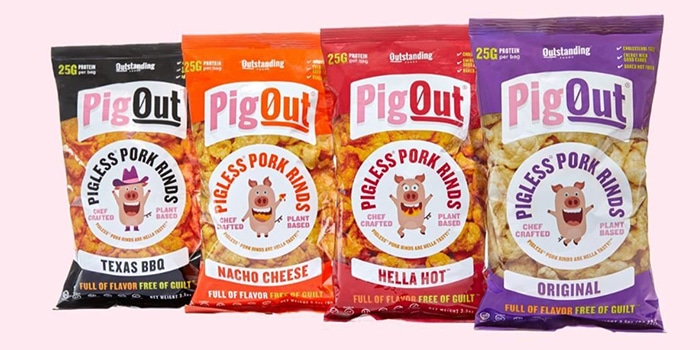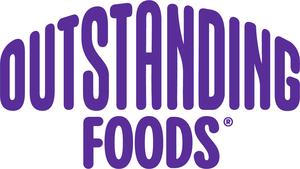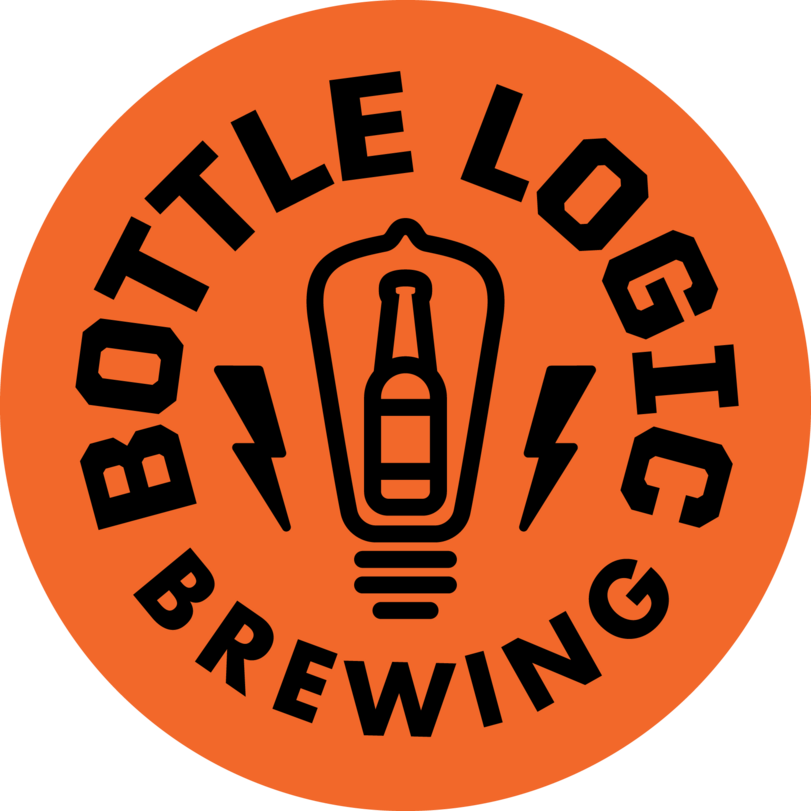Outstanding Foods Grows Distribution and Investors

To convince consumers to switch to plant-based foods, you have to make the move sacrifice-free, according to Outstanding Foods CEO and founder Bill Glaser. He believes that’s been the key to the success of competitor brands Beyond Meat and Impossible Foods, and with an additional $5 million in funding and a new product line, Glaser believes it’s Outstanding Foods’ time to step on the gas and achieve similar goals in the snack aisle.
Outstanding Foods, which produces PigOut “pigless” pork rinds, launched in April 2018 with the goal of offering shoppers better-for-you, plant-based iterations of conventional snacks. The company has raised $13 million in total, with this month’s $5 million convertible note including roughly 80 investors who each invested between $25,000 and $250,000.
To-date Outstanding has mostly raised funding from celebrities and influencers, including Snoop Dogg and, most recently, Los Angeles Laker JaVale McGee. However, this month’s raise is different, Glaser said.
“It’s less of a strategic investment and more about capital for growth,” Glaser said of this round. “[While] my strategy [with influencers and celebrities] was to attract people who not only believed in our opportunity, but loved the product enough to actually write a check and invest. Not only will they be willing to promote, but they’ll be more authentic when they do promote.”
Though the company plans to hit profitability in 2020, Glaser expects to raise another round early next year saying that “speed” and “profitability” don’t always go hand in hand.
The raise comes as the brand has rethought its initial product offering of bacon chips, pivoting away from that line. Glaser said though the bacon chip concept picked up distribution from retailers such as Sprouts and some regions of Whole Foods Market, it required a patent pending process that the company could not quickly scale and a new supply chain of the base ingredient — mushrooms — that proved complicated.
Instead Glaser and his co-founder chef Dave Anderson settled on pork rinds as the next snack opportunity, launching a new line in February. Though the category was brought to prominence by ketogenic shoppers looking for low carb options (PigOut’s product isn’t), Glaser said that the Keto crowd’s attention has had a ripple effect.
“Keto as a movement has made pork rinds more popular and as a result of making it more popular, it’s attracted not only people who are keto but also…consumers who aren’t keto,” Glaser said. “We are going after a market that…isn’t focused on the carbs so much as getting a great, high protein snack.”
The line has already gained distribution in one region of Whole Foods Market, Hy-Vee, Lassens and hundreds of independent retailers, Glaser added, and it will launch in Southern California 7-11 stores in August, followed by some Walmart locations and Kroger stores in the fall.
In the latter months of the year, the company also plans to expand into other snack products under the PigOut brand, including a relaunch of the bacon chip. The new iteration will utilize fewer mushrooms but will also have added protein. Other healthier takes on snack favorites will follow with other animal proteins — such as dairy — subbed out for vegan alternatives. The goal is to make products that appeal to all shoppers.
“We don’t want [consumers] to have to change their behaviors to have a healthier product,” Glaser said. “There are a lot of products on the market where the health benefits are the lead but they don’t taste great so people don’t stick with them.”
Glaser added that while in retail the brand will stick to shelf stable snacks, such as plant-based jerky, direct-to-consumer it may experiment with other temperature states, including selling the “raw” plant-based bacon used to make the chips. Although retail is a focus, direct-to-consumer will remain a key part of the company’s strategy towards achieving profitability, as well as serve as a launching pad for new items. However, though the margins may be better, Glazer said, in his opinion it’s just not feasible to build an entirely direct-to-consumer food business.
“[Even] the most successful direct-to-consumer companies will sell, over their lifetime, more product in retail than direct-to-consumer, just based on consumer behavior and what people feel comfortable with and their habits are,” Glaser said. “People are still shopping in supermarkets.”

















